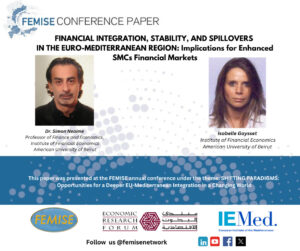Summary :

Abstract
Using a Structural Vector Auto Regression (SVAR) model, this study analyses the dynamic financial spillovers of the European Union’s (EU) leading economies on their neighbors in the south (Lebanon, Tunisia, Morocco, and Jordan) and their implications on regional financial integration and stability. Our empirical results show that major EU’s economies can generate significant regional spillovers through regional financial market linkages. We therefore argue with enhanced Euro-Mediterranean financial integration and vulnerability of the South Mediterranean Countries (SMCs), financial liberalization should be implemented gradually because there is a need to ensure that proper institutional infrastructures, such as strong prudential regulations and supervision, are put in place in order to avoid any potential future financial instability or crises. Moreover, the development of the domestic SMCs’ bond market should be made a priority to reduce financial instability and to tackle the existing negative spillover effects within the Euro-Mediterranean region.

